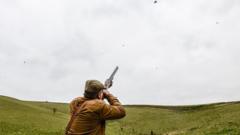Will Bird Flu Fears Lead to Tighter Hunting Regulations?

Published: 2025-09-10 22:00:16 | Category: wales
The Welsh countryside faces an urgent call for stricter regulations on the release of millions of gamebirds, with concerns over native wildlife and the risk of avian flu. As the shooting season begins, campaigners warn that the current practices present unsustainable pressures on local ecosystems. The Welsh government is considering a licensing system for gamebird releases, but a decision has yet to be made, raising questions about the future of wildlife protection in the region.
Last updated: 25 October 2023 (BST)
Key Takeaways
- The release of 800,000 to 2.3 million gamebirds annually raises concerns for native species.
- Calls for a licensing system have intensified due to avian flu outbreaks.
- The Welsh government has delayed decisions on stricter regulations since initial consultations in 2022.
- Local farmers express concern about the economic impact of potential restrictions on shooting.
- Environmental groups emphasise the need for immediate action to protect native wildlife.
The Current Situation of Gamebird Releases in Wales
Every year, the shooting season brings about the release of millions of gamebirds into the Welsh countryside. This practice has garnered significant attention from environmental groups, particularly as the number of non-native birds released continues to rise. The RSPB Cymru has labelled these practices as "unsustainable," noting that the influx of pheasants and red-legged partridges poses a threat to local wildlife.
Concerns Over Native Wildlife
Experts argue that the introduction of large numbers of non-native gamebirds creates competition for food and resources, thereby affecting rarer native species. Julian Hughes, head of species at RSPB Cymru, pointed out that the growing population of non-native birds increases predation pressures on vulnerable species such as curlews and black grouse.
The Impact of Avian Flu
The rise in avian flu cases has further complicated the debate over gamebird releases. Recent reports indicated that over 875 wild pheasants were found dead in Denbighshire, with tests confirming the presence of the disease. The proximity of these findings to critical breeding sites has raised alarms among conservationists, who fear that the spread of avian flu could decimate local bird populations.
Hughes noted that pheasants could pose a risk of transmitting avian flu to wild birds, many of which are already classified as threatened at a national level. This concern has amplified calls for a robust regulatory framework to manage gamebird releases.
Regulatory Developments and Delays
The Welsh government's approach to regulating gamebird releases has been marked by delays. Initially, in 2022, ministers sought advice on the potential need for stricter oversight. Following a public consultation, Natural Resources Wales (NRW) recommended a risk-based licensing framework, which would require gamekeepers to obtain permission before releasing birds in sensitive areas.
Despite these recommendations, no definitive action has been taken, leaving many stakeholders questioning the government's commitment to wildlife protection. Hughes expressed frustration over the lack of progress, stating, "We're now in 2025, and the government hasn't made any decision nor any announcement." The absence of a clear roadmap raises concerns about the long-term implications for Wales' biodiversity.
Economic Implications of Stricter Regulations
Farmers and members of the shooting community have voiced their concerns regarding the potential economic impact of stricter regulations. Helen and Will Jones, who operate a shoot on their farm in Powys, emphasised their commitment to conservation and expressed fears that tighter controls could threaten their livelihood. They highlighted the economic benefits of the shooting industry, stating that their conservation efforts have led to a resurgence of local wildlife.
James Evans, a Welsh Conservative and chair of the Senedd's cross-party group on shooting and conservation, warned that the proposed regulations could negatively affect rural economies. He argued that the shooting industry generates significant revenue, and any regulatory changes should not jeopardise jobs or the local way of life.
Future Considerations and Next Steps
The Welsh government has indicated that it is reviewing information from the gamebird release consultation while considering the implications of the ongoing avian flu situation. The need for a balanced approach that protects both wildlife and the interests of the shooting community is paramount. However, the clock is ticking, as ministers risk missing their revised deadline to implement a licensing system by the start of the autumn shooting season.
As the situation evolves, it remains crucial for stakeholders to engage in constructive dialogue to find a solution that safeguards Wales' unique biodiversity while supporting the livelihoods of those involved in the shooting industry.
FAQs
What is the current status of gamebird releases in Wales?
Gamebird releases in Wales are currently unregulated, with an estimated 800,000 to 2.3 million birds released annually. The Welsh government is considering a new licensing system to manage these releases, but no decision has been made yet.
Why are gamebird releases a concern for wildlife?
The release of non-native gamebirds can lead to increased competition for food among local species, as well as heightened predation pressures. This can threaten the survival of vulnerable species in the area.
What role does avian flu play in this discussion?
Avian flu outbreaks among released gamebirds have raised significant concerns about the potential risks to local wildlife populations. Cases of avian flu have been confirmed in wild pheasants, prompting calls for stricter regulations on gamebird releases.
What are the economic implications of stricter regulations on gamebird releases?
Farmers and shooting community members worry that tighter regulations could lead to job losses and negatively affect rural economies that rely on the shooting industry for income and conservation funding.
What is the timeline for potential changes in regulations?
The Welsh government is currently reviewing proposals for a licensing system but has not set a definitive timeline for implementation. Stakeholders are concerned that delays could lead to missed opportunities for wildlife protection.



